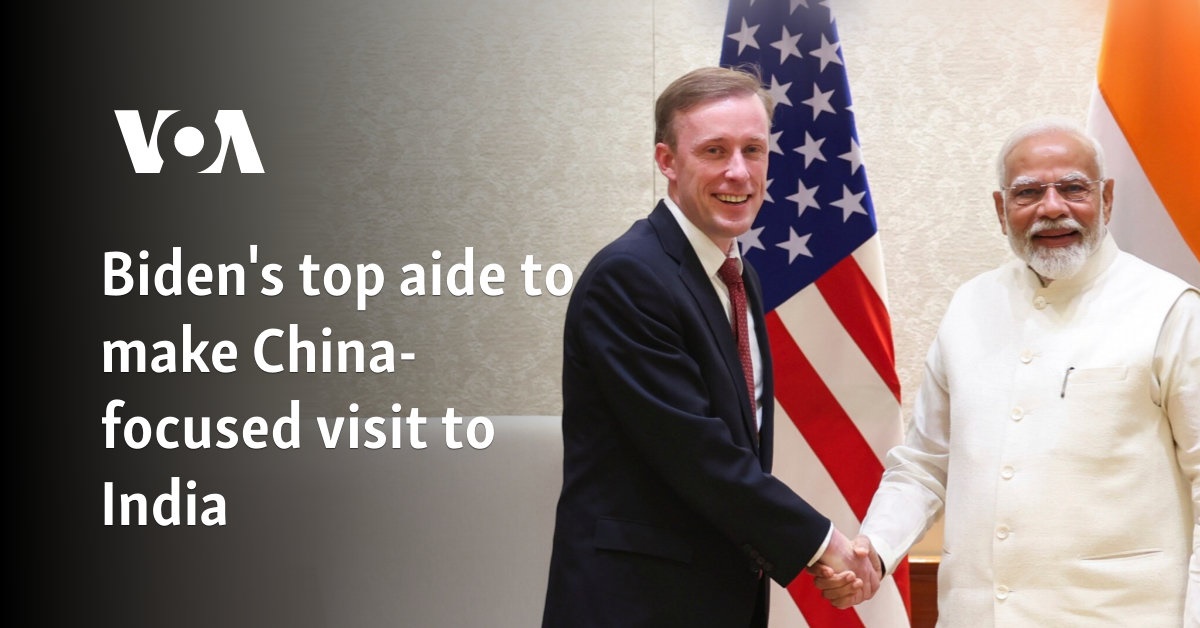
President Joe Biden’s national security adviser, Jake Sullivan, will make his final visit to India next week to emphasize Washington’s partnership with New Delhi, the White House announced Friday.
The visit will cap the Biden administration’s efforts to maximize ties with Prime Minister Narendra Modi’s government, in its strategic focus to counter China’s influence in the Indo-Pacific.
Strengthening ties with India has been a “real foreign policy priority and area of legacy achievement for the Biden administration,” a senior administration official said on condition of anonymity in a briefing to reporters Friday.
Sullivan will visit New Delhi January 5-6 to discuss a range of issues, including civil nuclear partnership, China’s overcapacity on semiconductor and biopharma supply chains, strategic technology cooperation and other shared security priorities, a second administration official said.
Sullivan’s visit comes as tension is brewing between India and China over Beijing’s plan to build what it calls the “world’s largest” hydro dam on the Yarlung Zangbo River on the eastern rim of the Tibetan plateau, which could affect millions downstream in India and Bangladesh.
Sullivan is expected to discuss the dam along with other regional issues of concern, said the first administration official in response to VOA’s question. “What matters to us is that when it comes to water resources that have to be managed across countries, that those are being handled fairly and in an equitable way,” the official said.
Technology initiative
A key focus of the visit is the U.S.-India initiative on Critical and Emerging Technology (iCET) – an effort that Biden and Modi announced in May 2022 to bolster their strategic technology partnership and defense-industrial cooperation between their governments, businesses and academic institutions across various domains, from AI to quantum computing, and from semiconductors to space.
Sullivan’s visit will take place just two weeks before President-elect Donald Trump assumes office January 20. Many expect iCET to continue under his administration.
“There is broad bipartisan support for some of the goals of iCET,” said the second administration official in response to VOA’s question. They include “strengthening the resilience of technology supply chains, working with allies and partners to position ourselves to offset PRC [People Republic of China’s] advancements in certain technologies, and efforts to dominate some of the supply chains.”
The U.S. strategic partnership with New Delhi is “based upon a bet that India’s economic, technological and military rise is critical to pushing back and containing China’s dominance in these fields,” said Aparna Pande, director of the Initiative on the Future of India and South Asia at the Hudson Institute.
Irritants have not derailed bilateral ties. Those include India’s democratic backsliding, and the case of a former Indian government employee charged in New York last year with murder-for-hire over his role in directing a foiled plot to assassinate a Sikh separatist and Modi critic.
Most of Biden’s policies on India will likely continue, Pande told VOA, as Trump’s desire to “push back or contain China’s rise – economic, technological and military – will help ensure that India is seen as a partner in this endeavor.”
During his first administration, Trump had a warm relationship with Modi. Trump attended a 2019 “Howdy Modi” rally in Texas, and Modi reciprocated by hosting a “Namaste Trump” rally in Ahmedabad in 2020.
This post was originally published on here







